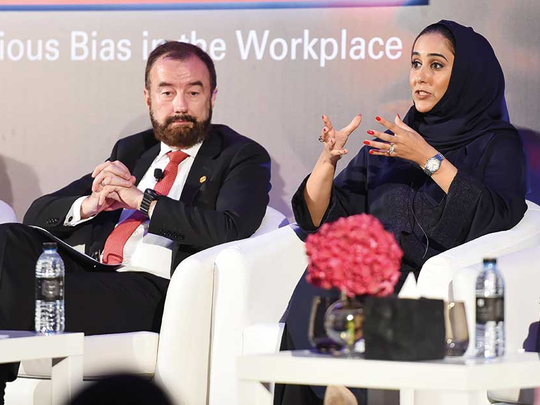
Dubai: Contrary to the view of many, balancing personal life and career growing is no longer a dilemma especially for women, at least from the perspective of Eman Abdul Razzaq, Regional Head of Human Resources and Chief of Staff to the Regional CEO, Mena at HSBC.
Paving the way for talents to grow and develop, regardless of the gender, background, age or ethnicity is one aspect of the policy HSBC is advocating internally.
The bank recently organised an event titled “re: think — Everyone’s silent issue” to discuss unconscious bias, and how this affects the working environment and production. The event was organised in cooperation with UAE Chapter of ‘100 Women in Finance’, a global network of professionals in different fields of finance and investments aiming to empower women in their careers, according to their website.
- Eman Abdul Razzaq | HSBC
“Why we are doing this? If you look at the UAE, it is a country agenda that they are trying to promote. If you look at banking [sector], it is a banking institution agenda that they would like to promote. If you look at HSBC, globally we are trying to promote diversity. At a global level, we have a diversity policy that we have been talking about for many many years,” Abdul Razzaq said.
HSBC, she said, was praised by many international media outlets, such as The Times of London and the Financial Times newspapers for its leading role in employing women going back to 2015.
Speaking to Gulf News in her office at the executive floor of HSBC headquarters in Dubai, Abdul Razzaq said proudly: “If I take you five years back, [on] this floor, which is the most senior executive for the region, only 10 per cent were women. Five years forward, nearly 42 per cent are women. So almost every other office you will walk into a female colleague. This is a huge achievement for us in the region. This is what we are trying to celebrate, and this is what we trying to educate every one that we managed to reached there — there is a long way to go, but we managed to get there.”
In the executive floor of HSBC regional office, which covers Middle East, North Africa and Turkey, women occupy five top positions. They include regional HR, Chief Information officer, Chief Financial officer, Chief Operation officer, Regional head of Corporate Real Estate. They are coming from different countries, including UAE, Jordan, Turkey and the US.
Moreover, “women in HSBC across the Mena region are 50-50. This is a huge statistic, which tells you that women do see HSBC as a good place to join,” she said.
Apart from the issue of gender equality, women participation carries economic benefits.
Global GDP, according to McKinsey Global Institute report of 2015, would increase 11 per cent or $12 trillion (Dh44.06 trillion) could be added to global GDP by 2025 by advancing women’s equality. Furthermore, a “full potential” scenario in which women play an identical role in labor markets to that of men, as much as $28 trillion, or 26 per cent, could be added to global annual GDP by 2025.
Abdul Razzaq recalled with immense pride how she herself has grown up professionally within the bank she joined almost 16 years as a commercial banker.
Today, she is utilising her knowledge, passion, devotion and creation to make the working environment free from any bias. “We are doing it, because it is the right thing to do as an organisation,” she said. The objective is “to recruit talent. Talent regardless, male, female, young, old, different background, different nationalities, you can come from many different backgrounds, but we want you because you are [a] talent. And because we want talent, we need to cater for the different diversity needs of our employees.”
Hiring talented people, including women, is just one-step that needed to be followed by other steps to allow the employee to grow and produce.
“Attracting women is part of the challenge. The bigger part of the challenge is what you do to grow women in the banking industry, because it is easier to attract them at the junior level, but to make them grown and promote them in the senior roles that is where the real challenge is for HR and leadership teams in the [banking] industry,” said Abdul Razzaq.
For HSBC, “it has come through different interventions, different products that we tried to introduce to help make that change,” she explained.
Among the different “products” that were offered to executives were flexibility from a working timings perspective, the option to work from home, and sabbatical leave, which the bank introduced last year to allow executives, who meet certain requirements, to take a leave up to 18 months.
The recent “RE-think” event had a very encouraging reaction from participants hailing from diverse fields, including medical, law as well as banking. The positive feedback can only encourage HSBC to make the next move in the near future.











